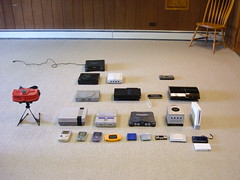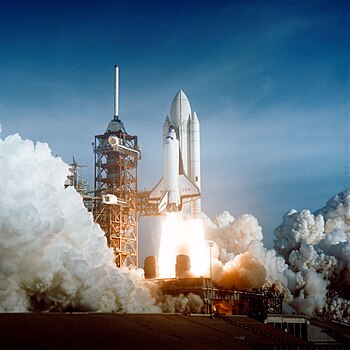The
space shuttle is the last vestige of NASA's poltical theater era, when big, showy, hideously inefficient and unsupportable technical projects were its bread and butter. It's Nixon-era tech -- literally -- strung along for all the same government inertia keep-the-contractors-happy idiocy that's bankrupting our national treasury.
Consider, the shuttle is a
reusable spacecraft that isn't actually reusable, given that the SRBs and main fuel tank are either lost or nearly 100% refitted after every launch. It's a construction platform for a spacestation that only needs a construction platform to assemble because it was badly designed by a lets-get-everyone-involved international consortium. The shuttle can retrieve cargo from orbit -- a task that no one wants or needs. And it can ferry crew and cargo to orbit simultaneously, which is actually a terrible idea as it's cheaper -- and far safer -- to send crew and cargo up separately on smaller, task-specific craft. The
Progress cargo ships and modern Soyuz capsules are examples of this principle.
Like most government projects, the shuttle looks good on camera and makes for great press, but is actually a terribly impractical and inefficient solution to a complicated set of problems.
And don't get me started on
how bad the ISS is at every task it's been assigned.
Human spaceflight is 50 years old. We're past the "do it just to prove we can" stage.
It's time to be grownups. It's time to build space technology that solves real problems in practical ways, rather than in ways that make contractors and photographers happy. We can achieve low earth orbit really easily and keep humans in that environment for months or years. We get it. We're good at it. Time to move on.
Now, if you want
LEO cheaply, that's not what the government is good at. That's the job of the private sector. Government paves the way. The market makes it profitable. It's time for profitable LEO and human orbital habitation. NASA's job is to pave the way for the next level of hard stuff, and the next level is REALLY HARD.
Where is my advanced
asteroid detection and deflection system? That's a serious problem that NASA should be solving and isn't.
Where is my proof-of-concept
Helium-3 extractor for the moon, which would give us a legitimate reason for going there?
Where is my
methane-oxygen autofactory for Mars, which is required before we even think about sending humans in that direction?
Where is my
Lagrange-point automated telescope, which would make
the Hubble look like a kid's toy magnifying glass and would actually require us to deal with serious, complex at-a-distance systems maintenance -- the kind of thing space colonies will represent?
Where is my FRAKKING
SPACE ELEVATOR, which would actually be a serious surface-to-orbit gamechanger?
NASA has better things to do than keeping 30-year-old tech around for nostalgic PR purposes. I, for one, am glad to see them putting away childish things and -- hopefully -- getting down to serious business.
 Image via WikipediaMy wife has informed me that I am required to attend this year's Dragon*Con. I've never been, and as we're expecting our second child in December, this may be my last chance for quite a while. Thus, if anyone has any tips for a Dragon*Con n00b -- fair warning, I've been to San Diego Comic-Con, so I'm acquainted with cons at large scales -- I'd be glad to hear them. Moreover, if you're a known acquaintance attending Dragon*Con and are interesting in splitting a ride and/or hotel digs, look me up.
Image via WikipediaMy wife has informed me that I am required to attend this year's Dragon*Con. I've never been, and as we're expecting our second child in December, this may be my last chance for quite a while. Thus, if anyone has any tips for a Dragon*Con n00b -- fair warning, I've been to San Diego Comic-Con, so I'm acquainted with cons at large scales -- I'd be glad to hear them. Moreover, if you're a known acquaintance attending Dragon*Con and are interesting in splitting a ride and/or hotel digs, look me up.




